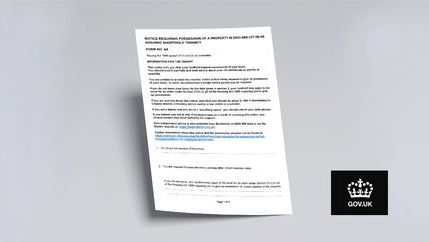What to do when evicting a tenant
Talk to your tenant
It is always better to resolve any disputes without the need for court action. First see if you can reach an agreement with your tenant or help them establish a plan for moving out or repaying any rent arrears.
Make sure you keep a log of any correspondence and that any agreement reached is recorded in writing. You could follow up a phone call or face-to-face conversation with an email confirming what was said and agreed.
If you serve a notice keep a record of the date you served it, you could ask the tenant to sign a receipt, you can complete Form N215: Certificate of service or by writing 'served by [your name] on [the date]' on the notice. If your tenant doesn’t leave by the specified date, you can use your completed Form N215 or notice to apply for an accelerated possession order.
Where in the UK are you based?
Check which eviction process to take
When considering the process of eviction, there are two possibilities for terminating a tenancy in England:
- Section 21 Notice: if you want your property back after the fixed term has ended or during a periodic tenancy
- Section 8 Notice: if you need the property back for any other reason, such as if the tenant has broken the terms of the tenancy
Section 21 Notice
A Section 21 notice requiring possession must be given to the tenant on a specific form called Form 6a:
- You must give your tenant at least two months’ notice
- You cannot serve notice before the first four months of the tenancy
- You cannot serve notice if you have received an improvement notice or emergency works notice for the property from the council within the last six months
- If the tenant does not leave on the date specified, you have six months from the date of the notice is served to apply to court for a possession order
To serve a Section 21, you must have also provided your tenant with an up-to-date Gas Safety Certificate, Energy Performance Certificate (EPC), tenancy deposit Prescribed Information and a copy of the Government's How to rent guide and have a licence for the property (if it requires one).
Section 21, Section 8 and Section 13
These common tenancy notices are Government prescribed forms available to download from their website. This resource offers a little more information into each one and where you need to go to download them.
Section 8 Notice
A Section 8 notice requiring possession must be given to the tenant on a specific form called Form 3, the latest version can be found on the Government’s website here.
Unlike a Section 21 notice, you must give a reason for the eviction under Section 8. The reasons you can use are called grounds. There are two types of grounds, Mandatory (grounds 1–8) where a court must grant possession for these grounds, and Discretionary (grounds 9–17) where a judge in court must decide whether it is reasonable to grant possession.
| Ground | Description | Notice period |
| Ground 1 | The landlord requires the property in order to use it as their main residence. | Two months |
| Ground 2 | The mortgage lender on the property has served notice to foreclose. In this case the mortgage in question has to predate the start of the tenancy. | Two months |
| Ground 3 | The property was previously used as a holiday let and is required to return to the status of holiday let. | Two weeks |
| Ground 4 | The property is being let by an educational institution and is now required by students of the educational institution. Written notice that this may happen must be served before the tenancy begins. | Two weeks |
| Ground 5 | The property is owned by a religious body and they require possession for a member of their church i.e. a Minister of Religion. | Two months |
| Ground 6 | The landlord wants to demolish, reconstruct or redevelop all or part of the property. And the work cannot reasonably be carried out while the tenant remains in the property or the tenant has refused to remain in the property. If granted the landlord is required to pay all reasonable moving costs to the tenant. | Two months |
| Ground 7 | Under an assured tenancy, the tenancy has been passed on following the death of the original tenant. The landlord must serve a Section 8 notice within 12 months of the death of the named tenant. | Two months |
| Ground 7a | Serious anti-social behaviour in the locality of the house or against someone who lives nearby or against the landlord or managing agent including conviction of a serious offence, a breach of an Injunction to Prevent Nuisance or Annoyance, breach of a Criminal Behaviour Order, if a closure order has been made on the property or if the tenant, or anyone living in or visiting the property, has been convicted of an offence relating to noise nuisance. |
Four weeks for periodic tenancy, one month for fixed term |
| Ground 7b | The tenant has no right to rent in the UK. | Two weeks |
| Ground 8 |
The tenant has failed to pay more than eight weeks rent in the case of weekly payments, two months in the case of monthly payments or one quarter in the case of quarterly payments. They must be in arrears at the time of serving notice and at the time of the hearing in court. |
Two weeks |
| Ground | Description | Notice period |
| Ground 9 | Suitable accommodation of the same type and quality has been offered to the tenant. The landlord is required to pay all reasonable removal costs if possession is granted. | Two months |
| Ground 10 | The rent is in arrears at the time of serving notice and at the time of the hearing in court. The court may find that this is not grounds for possession if there is an outstanding claim for benefits or if payment of benefits makes it look like the tenant is in arrears at some times but the rent is being paid. | Two weeks |
| Ground 11 | The tenant is repeatedly late with payments or repeatedly fails to pay their rent until prompted by the landlord. | Two weeks |
| Ground 12 | The tenant has breached any of the terms listed in the tenancy agreement. The court may make a decision on whether it believes the terms to be fair. | Two weeks |
| Ground 13 | The tenant has neglected or damaged the property, or they have sublet the property to another individual who has neglected or damaged the property. | Two weeks |
| Ground 14 | The tenant is guilty of behaviour causing or likely to cause nuisance, or annoyance, or they have been convicted for illegal or immoral use of property. | Immediately |
| Ground 14a | Domestic abuse (social tenancies only – where the victim has permanently left the property) | Two weeks |
| Ground 14za | The tenant has been convicted of an offence during a riot in the UK. |
Two weeks |
| Ground 15 | The furniture listed on the property inventory has been misused, damaged, broken or sold by the tenant or any individual living with them. | Two weeks |
| Ground 16 |
The property was let to the tenant as a condition of their employment but the employment has now come to an end. |
Two months |
| Ground 17 |
The property was let on the basis of false information provided by the tenant or one of their referees/ guarantor. |
Two weeks |
Each ground has a different notice period, for example, for ground 8 you need to give two weeks’ notice before you can apply to the court for a warrant of eviction. If the tenant does not leave on the date specified, you have 12 months from the date of the notice is served to apply to court for a possession order.
Check which eviction process to take
Following the implementation of the Private Housing (Tenancies) (Scotland) Act 2016 all new tenancies started after 1 December 2017 will be a Private Residential Tenancy.
This means that if you want to evict a tenant, you will need to give the tenant a notice to leave. This tells them the reasons you are asking them to leave and the date they should leave by. The reasons you can use are called grounds.

Notice to leave
Mygov.scot
You must give at least 28 days' notice if the tenant has lived in the property for six months or less, regardless of what eviction ground you are using.
If they have lived in the property for more than six months, the notice period for some grounds is still 28 days, for all others you must give 84 days’ notice.
All grounds are discretionary, which means that the First-tier Tribunal (Housing and Property Chamber) must make a decision on whether to grant an eviction order.
Grounds for eviction in Scotland
| Ground | Description | Notice period |
| Landlord intends to sell the let property |
If you plan to sell the property within three months of the tenant moving out. You must be able to evidence this through a recent Home Report or letting from a solicitor or estate agent. |
84 days |
| Let property to be sold by lender | The mortgage lender on the property has served notice to foreclose. | 84 days |
| Landlord intends to refurbish the let property | If you want to carry out works which are too disruptive for the tenant to continue living there. Evidence could include planning permissions. | 84 days |
| Landlord intends to live in let property | If you wish to live in the property. Evidence could be an affidavit, stating your intention signed under oath. | 84 days |
| Landlord intends to use the let property for non-residential purpose | If you want to use the property for anything other than a home. | 84 days |
| Let property required for religious worker | If the property is required for a member of their church i.e. a Minister of Religion. | 84 days |
| Tenant has a relevant criminal conviction |
If the tenant has been convicted of an offence including using the property, or allowing someone else to use it, for illegal reasons or committing a crime in or near the property. You must apply under this ground within a year of the conviction. |
28 days |
| Tenant is no longer occupying the let property | If the tenant is no longer using the property as their main home, but not if they moved out because the property was unsafe due to disrepair. |
28 days |
| Landlord's family member intends to live in the let property | If a family member intends to live in the property for at least three months. | 84 days |
| Tenant no longer needs supported accommodation |
If the tenant moved in because they needed community care but they have now been assessed as no longer having that need. |
84 days |
| Tenant has breached a term of the tenancy agreement |
If the tenant hasn't complied with one or more of the terms of tenancy, not including rent arrears. |
28 days |
| The tenant has engaged in relevant antisocial behaviour |
If the tenant has caused alarm, distress, nuisance, annoyance or harassment to another person. You must apply under this ground within a year of the conviction or the behaviour taking place. |
28 days |
| Tenant has associated in the let property with someone who has a criminal conviction or is antisocial |
If the tenant has allowed someone in the property to act in an antisocial way including a sub-tenant, lodger or a person the tenant lets in on more than one occasion. You must apply under this ground within a year of the conviction or the behaviour taking place. |
28 days |
| Landlord has had their registration refused or revoked |
If you have been refused or removed from the register of landlords by the local council. |
84 days |
| Landlord's HMO licence has been revoked |
If a license for a Housing of Multiple Occupancy (HMO) has been removed, it would no longer be legal for the property to be let as a HMO. |
84 days |
| An overcrowding statutory notice has been served on the landlord |
If a overcrowding statutory notice has been served meaning that the property is so overcrowded that it is unsafe. |
84 days |
| Tenant is in rent arrears over three consecutive months |
If the tenant has been in arrears for three or more months in a row. The Tribunal will consider the facts including if delayed benefit payments have contributed to the arrears. |
28 days |
| Tenant has stopped being, or has failed to become, an employee |
If the tenant moved in under the basis of being or becoming an employee of the landlord but now is not one. |
84 days |
The Renting Homes (Wales) Act 2016 is an Act of the National Parliament for Wales that received Royal Assent on 18 January 2016. The legislation builds on the Housing Act (Wales) 2014 and makes several key changes to housing law in Wales. Click here for more information on the Act.
What not to do when evicting a tenant
Neglect your obligations
You must make sure your end of the tenancy agreement has been upheld during the notice period. Landlord obligations such as maintenance still need to be diligently addressed, failure on your part could result in legal action.
Change the locks
Entering the property to change the locks without notice and prior to the tenant vacating the premises is a criminal offence which could lead to a substantial fine or even imprisonment.
Remove the tenant's belongings from the property
Holding a tenant’s belongings in lieu of unpaid rent, or removing it from the property before the tenant has left, is also a criminal offence where you could be heavily penalised. Failing to return a tenant's possessions could result in prosecution.
Shut off the utilities
Switching off the utilities such as gas, water, electricity is a serious act. As a landlord, you need to fulfil your legal obligations and shutting off a tenant’s water supply could result in criminal action.
Need more advice? Find your local ARLA Propertymark Protected letting agent

Propertymark Protected agents can value the potential rental yield for your property, undertake referencing, tenancy agreements, deposit protection, maintenance, inventories and ensure you're compliant with the law. By using a Propertymark member you are guaranteed to be consulting with a professional agent who will give you up-to-date advice and guidance.



